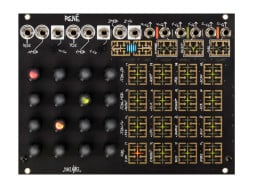Make NoiseMultiMod Complex CV Generator + Voltage Processor
-
 Free
Free
Shipping -
 No Hassle
No Hassle
Returns -
 Extended
Extended
Warranty -
 Low Prices
Low Prices
Guaranteed
Make Noise MultiMod
In the ever-expanding realm of modular synthesis, where tangled cables promise infinite sonic discovery, MultiMod from Make Noise emerges as a beacon of elegant control amidst the chaos. Eschewing the labyrinthine sprawl of traditional modulation routing, this ingenious device takes a single control signal and unfurls it into eight distinct yet interconnected variations, each subtly sculpted through weighted phase and speed adjustments. Patch a signal to the In and eight copies are fed to the outputs, with each subsequent output shifted in phase with the Phase control. Spread will adjust how different the outputs are from the original while Time determines the range captured at the input. When nothing is patched, an internal LFO is spread across the 8 inputs with the same parameters affecting it.
A modulation tapestry in which each thread dances in relation to the whole—cohesive, yet never identical. With this trifecta of core parameters—Phase, Spread, and Time—MultiMod grants effortless dominion over complex movements, offering a symphony of shifting voltages at the mere twist of a knob. Using the Tempo, Rest and Hold inputs, you can creatively rearrange the temporal reality of any patch. Built on cutting-edge DSP hardware and boasting an ultra-wide 20V signal range (+/-10v), MultiMod from Make Noise is both a utility and a portal into modulation bliss.
MultiMod Features
- 8 Channel CV processor
- Each output related to the input with vari-speed and phase modulation applied
- Phase control adjusts the spacing with each channel have a unique weight
- Time affects input signal capture
- Spread adjusts the vari-speed of the copies
- -10v–+10v range
- Calibrated outputs for use with quantized pitch information
- Internally generated LFO when unpatched
- Eurorack module
- Width: 10hp
- Depth: 39mm
- Current draw: 195mA @+12v, 10mA @-12v
MultiMod represents a new approach to complex modulations: it takes a single control signal and copies it 8 times, additionally modifying those copies by weighted adjustment of their relative phase and speed. The result is a flock of related modulation signals, all derived from the same single input.








Welcome Back!
Not a member yet?
You're in!
Join the Club!
As a member, get...
You're in the Club!